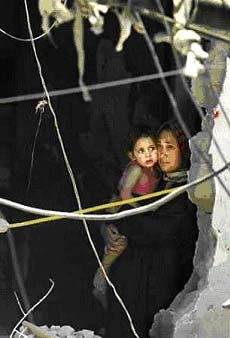

The Impact of the Conflict on Daily Life
One Big Prison
New Report Warns Against Continued Strangulation of Gaza Strip after Disengagement
Download the Report, “One Big Prison”
|
|
Israel has cut off the Gaza Strip from the rest of the world to such an extent that it is easier for Palestinians in Israel or the West Bank to visit relatives in prison than visit a relative in Gaza. This is one conclusion of the 100-page report that B’Tselem and HaMoked publish today. One Big Prison documents the ongoing violations of human rights and international law resulting from Israel’s restrictions on the movement of people and goods between Gaza and the West Bank, Israel, and the rest of the world. The report also warns against Israel’s attempt to avoid its responsibility toward residents of the Gaza Strip following disengagement.
Despite the easing of restrictions that Israel declared following the Sharm el-Sheikh summit in February 2005, there has been almost no improvement in the movement of Palestinians to and from Gaza, nor in the movement of goods. The report illustrates the extent to which Israel treats many fundamental human rights – among them the right to freedom of movement, family life, health, education, and work – as “humanitarian gestures” that it grants or denies at will.
Report Highlights:
- As a result of the economic siege on Gaza, more than 77 percent of Gazans (1,033,500 people) now live below the poverty line – almost double the number before the intifada. Some 23 percent of Gazans (over 323,000 people) are in “deep poverty,” meaning that they do not reach the subsistence poverty line even after receiving aid from international agencies.
- The forced isolation of Gaza tears many Palestinians from their families, and in some cases even separates spouses. The report includes the testimonies of a woman whose husband was expelled from the West Bank to Gaza, and of a mother whose son has never seen his father.
- Almost all the restrictions on movement are imposed on entire categories of people, based on sweeping criteria, without checking if the individual poses a security risk, and without weighing the harm the person will suffer, or if less harmful alternatives are available. In most cases, where Israel denies a permit and human rights organizations intervene, Israel reverses its decision to avoid an embarrassing legal challenge.
- Most components of the policy of strangulation are illegal under international and Israeli law.
The strangulation of the Gaza Strip increased following Palestinian attacks against civilians in Israel and the Occupied Territories over the past few years. Targetting civilians is a “war crime” and never justified. Israel is entitled, even obligated, to protect its citizens. However, Israel’s right to self-defense does not permit it to trample on the rights of an entire population.
Israel declared that “completion of the disengagement will invalidate the claims against Israel on its responsibility for the Palestinians in the Gaza Strip.” In the report, HaMoked and B’Tselem emphasize that all the suffering described in the report is likely to continue, and even worsen, after disengagement, for which Israel will be continue to bear legal responsibility.
| Videos & Multimedia |
Video – Soldiers Force a Palestinian to Play Violin at Roadblock |
| Additional Resources |
World Bank Report – Twenty-Seven Months – Intifada, Closures and Palestinian Economic Crisis |
| Organizations |
| Stay Informed |
|
Sign up for our mailing list and receive an email whenever we post a new article on our news site, Israel-Palestine News. |
If Americans Knew distributes and posts to our website copyrighted material, sometimes without the permission of the copyright owner. We are making such material available in our efforts to advance understanding of the Israel/Palestine conflict. We believe this constitutes a ‘fair use’ of any such copyrighted material as provided for in section 107 of the US Copyright Law since it is being distributed without profit for purely educational purposes. For more information go to: http://www.law.cornell.edu/uscode/17/107.shtml. If you wish to use copyrighted material from this site for purposes of your own that go beyond ‘fair use’, you must obtain permission from the copyright owner.
This website is printer-friendly. Please Print this article and share it with your friends and family.


